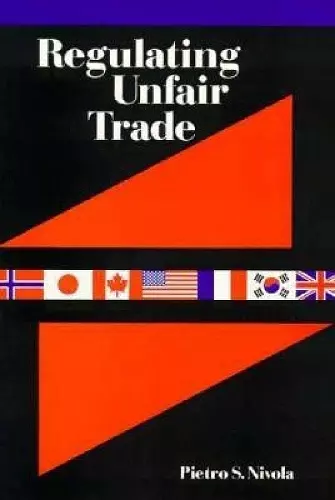Regulating Unfair Trade
Format:Paperback
Publisher:Bloomsbury Publishing PLC
Published:1st Jan '93
Currently unavailable, and unfortunately no date known when it will be back

"An excellent account of trade regulation: balanced, informative, intelligent. Nivola captures the interplay among trade regulators as well as the effects of regulation. This is required reading for anyone interested in trade regulations." --Ronald A. Cass, Dean, Boston University School of Law "Nivola has written an excellent book that addresses a complex subject in a scholarly yet highly readable fashion. It brings an original perspective to the unfair trade debate, by ably balancing the tension between persistent underlying pressures for trade relief (whether trade is fair or unfair) and genuine grievances that American Firms find with foreign trade practices" --Gary Clyde Hufbauer, Reginald Jones Senior Fellow, Institute for International Economics "This is an exceptionally readable book. because of the author's engaging style, it is likely to be popular with a considerably larger audience than just academics, economics and political science students, and specialists in trade policy...An interesting and convincing analysis." --Robert A. Baldwin, Hilldale Professor of Economics, University of Wisconsin
Analyzes the US government's efforts to combat the objectionable trading practices of other countries, arguing that some US regulatory activity has acquired a political momentum of its own, in part because it offers policymakers the ends and means to aid constituents at relatively little risk.In the early 1980s, American complaints about unfair trade practices began to intensify. Sunrise industries, such as manufacturers of semiconductors and telecommunications equipment, joined older complainants, including steel and textile producers, in seeking more safeguards against international competitors who priced their products too aggressively or whose governments subsidized exports or protected home markets. In this politically charged atmosphere, the U.S. government has devised increasingly stringent regulatory programs to address the claimed abuses and distortions. In this book, Pietro Nivola examines the strenuous effort to combat the objectionable trading practices of other countries. Through most of the postwar period, Nivola notes, policymakers had deemed it in the nation's economic and strategic interests to tolerate asymmetries and infractions in the international trading order. But that tolerance has been sharply lowered by heightened sensitivity to inequities, and a growing conviction that government should intervene, frequently and forcefully, to ensure a ""level playing field."" The book maintains that foreign protectionism lower East-West tensions, and alleged American decline in the face of international competition cannot fully explain the stiffening regulation of unfair trade. The world trading system, Nivola contends, is not more restrictive now than it was earlier. Cries about foreign commercial transgressions in recent years have remained shrill despite a formidable U.S. export boom and an improved current account valance. Much of the U.S. regulatory activity has acquired a political momentum of its own. The activity has increased not just because global competitive pressures have generally intensified but because we have developed more ways and inducement to complain about those pressures. Nivola cautions that trade regulations now bears too much of the burden for ameliorating economic imbalances and deficiencies. The tendency adds to a sense of frustration that fuels demands for additional regulations. While recognizing the need for an explicit and responsible trade policy, Nivola concludes that such a policy must be based, first and foremost, on realistic expectations. Trade actions need to compliment, not subordinate, a more basic agenda: improvement in the national rates...
"An excellent account of trade regulation: balanced, informative, intelligent. Nivola captures the interplay among trade regulators as well as the effects of regulation. This is required reading for anyone interested in trade regulations." —Ronald A. Cass, Dean, Boston University School of Law
|"Nivola has written an excellent book that addresses a complex subject in a scholarly yet highly readable fashion. It brings an original perspective to the unfair trade debate, by ably balancing the tension between persistent underlying pressures for trade relief (whether trade is fair or unfair) and genuine grievances that American Firms find with foreign trade practices" —Gary Clyde Hufbauer, Reginald Jones Senior Fellow, Institute for International Economics
|"This is an exceptionally readable book. because of the author's engaging style, it is likely to be popular with a considerably larger audience than just academics, economics and political science students, and specialists in trade policy...An interesting and convincing analysis." —Robert A. Baldwin, Hilldale Professor of Economics, University of Wisconsin
ISBN: 9780815760894
Dimensions: unknown
Weight: unknown
210 pages